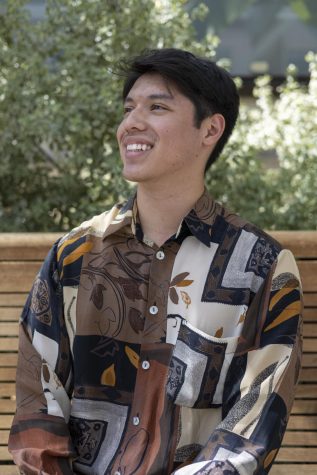Holocaust Memorial Week aims to ‘teach young people about the Holocaust’
This illustration depicts a Star of David with candles among a pattern. Every year, Oregon State University observes Holocaust Memorial Week with events, activities, and exhibits.
April 27, 2022
In its 35th year of programming, Oregon State University’s Holocaust Memorial Week, which will continue until May 3, will feature various speakers giving insight on the Holocaust and its history.
The first event of Holocaust Memorial Week started on April 25, but there are five other events that will analyze not only the Holocaust but other genocides across the world in different eras.
Of the six, three are available on campus and include talks from director of the Kaku-Ixt Mana Ina Haws, Luhui Whitebear; Laureen Nussbaum, a friend of Anne Frank and firsthand witness to Nazi oppression; and political science professor Hua-Yu Li.
The talk by Li will take place on April 27 at 7 p.m. in the MU Horizon Room 49 and through a webcast. Whitebear’s talk will take place on April 28 at 7 p.m. in the MU Horizon Room 49 and through a webcast. The talk from Nussbaum will be on May 2 at 7 p.m. in the MU Horizon Room 49 and through a webcast.
There will be other talks and events from various speakers that will take place until May 3. Information about each event can be found on the Holocaust Memorial Week Program website.
According to the webpage, the aim of promoting awareness about the Holocaust is to “teach young people about the Holocaust, so that coming generations will not forget the lesson that a preceding one learned at such cost.”
Nussbaum, born Hannelore Klein, said she had found out by chance that someone was writing about the person responsible for saving her life, Hans Calmeyer. Nussbaum said she then contacted the person writing the biography because she wanted to translate it into English.
“As I was translating it, I noticed it has much too much German politics, which would not be interesting to American readers,” Nussbaum said.
After receiving advice from a friend and author, Ursula LeGuin, Nussbaum said she decided to add her own story into the book to make it more personal.
The focus of the book, according to Nussbaum, is on the power of a single person to be able to make great changes and save lives—as was the case with Calmeyer.
“I’m very pessimistic now, not just because of Ukraine, but other places in the world,” Nussbaum said. “People in western China are being persecuted mercilessly. Israel is treating Palestinians as secondary people. It’s all over and it’s very depressing.”
Li, whose parents lived through the Cultural Revolution in China, presents another perspective on genocides in general. While her father was a professor of Russian studies, Li’s mother was from Japan and taught Japanese to students.
“[My father], like many of those in his generation, they were targeted,” Li said. “My father, like many others, was struck in public, beaten, humiliated, and taken to the streets to be paraded.”
The number of deaths during the Cultural Revolution in China is estimated to be anywhere from the hundreds of thousands to the millions.
Whitebear’s talk will be on missing indigenous and murdered women, with thousands reportedly having gone missing in 2016 alone.
The programming for Holocaust Memorial Week was arranged by the OSU Holocaust Memorial Committee, which is chaired by Paul Kopperman and includes faculty and students from the Schools of History, Philosophy and Religion; Public Policy; and World Languages and Cultures, as well as community members.
Kopperman has worked with the Holocaust Memorial Committee for 35 years. He is a professor of history at OSU and teaches classes on the Holocaust and has worked to enhance the visibility of Holocaust research and teaching.
Philipp Kneis, an instructor of political science at OSU who has been a member of the committee since 2012 has been teaching about topics related to the Holocaust and questions of social justice since before joining OSU ten years ago.
“I feel that there’s a deep need for deep responsibility we all have, not just for the past, but for the future,” Kneis said. “We need to confront our past, we need to learn from it, we need to inform what we do in the present.”
Together with OSU student Rebecca Murray, Dr. Kneis has organized the 6th Social Justice Conference as part of Holocaust Memorial Week, which will be held virtually on April 29 from 9 a.m. to 2 p.m. as a webcast.












































































































